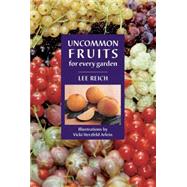
| Preface | p. 7 |
| Acknowledgments | p. 9 |
| Juneberry: A Cosmopolitan Blue Berry | p. 11 |
| Beach Plum: A Tasty Fruit Not Just for the Beach | p. 21 |
| Alpine and Musk Strawberries: Diminutive Delectables | p. 30 |
| Pawpaw: Banana of the North | p. 41 |
| Raisin Tree: Candied Fruit for the Picking | p. 53 |
| Lingonberry: Dainty Looks, Sturdy Disposition, and Tasty Berries | p. 57 |
| Actinidia: Emeralds in the Rough | p. 68 |
| Mulberry: A Summer Fruit-of-Many-Colors | p. 87 |
| Kaki and American Persimmons: Fruits of the Gods | p. 97 |
| Elaeagnus: Gumi, Autumn Olive, and Russian Olive | p. 114 |
| Gooseberry: Fruit with a Checkered Past | p. 121 |
| Maypop: A Passionflower for the North | p. 137 |
| Che: Chewy Dollops of Maroon Sweetness | p. 145 |
| Black Currant: Fruit from Fragrant Bushes | p. 151 |
| Nanking Cherry: Cherries on a Bush | p. 162 |
| Cornelian Cherry: From the Shores of Ancient Greece | p. 169 |
| Currants, Red and White: Sprightly, Translucent Jewels | p. 178 |
| Asian Pear: The Crunch Pear | p. 187 |
| Jostaberry: The Gooseberry and Black Currant Hybrid | p. 197 |
| Lowbush Blueberry: More American Than Apple Pie | p. 201 |
| Jujube: The Chinese Date | p. 211 |
| Shipova: A Sweetie with a Blush | p. 219 |
| Medlar: Lost in the Middle Ages | p. 225 |
| Epilogue | p. 233 |
| Nomenclature | p. 235 |
| Pollination | p. 237 |
| Siting and Planting | p. 239 |
| Pruning | p. 246 |
| Propagation | p. 252 |
| Mail-Order Sources for Plants or Seeds | p. 261 |
| Index | p. 273 |
| Table of Contents provided by Rittenhouse. All Rights Reserved. |
The New copy of this book will include any supplemental materials advertised. Please check the title of the book to determine if it should include any access cards, study guides, lab manuals, CDs, etc.
The Used, Rental and eBook copies of this book are not guaranteed to include any supplemental materials. Typically, only the book itself is included. This is true even if the title states it includes any access cards, study guides, lab manuals, CDs, etc.
Excerpted from Uncommon Fruits for Every Garden by Lee Reich
All rights reserved by the original copyright owners. Excerpts are provided for display purposes only and may not be reproduced, reprinted or distributed without the written permission of the publisher.